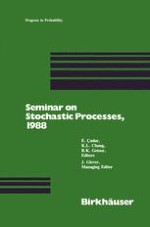1989 | OriginalPaper | Buchkapitel
Gauge Theorem for Unbounded Domains
verfasst von : Kai Lai Chung
Erschienen in: Seminar on Stochastic Processes, 1988
Verlag: Birkhäuser Boston
Enthalten in: Professional Book Archive
Aktivieren Sie unsere intelligente Suche, um passende Fachinhalte oder Patente zu finden.
Wählen Sie Textabschnitte aus um mit Künstlicher Intelligenz passenden Patente zu finden. powered by
Markieren Sie Textabschnitte, um KI-gestützt weitere passende Inhalte zu finden. powered by
Let {xt, t⩾0} be the Brownian motion process in Rd, d⩾1; D a domain (nonempty, open and connected set) in Rd; q a Borel function on D. Put $${\tau_D} = \inf \left\{ {t > 0:{X_t} \notin D} \right\}, $$ and (1) (1)$$u(x) = {E^X}\left\{ {{\tau_D} < \infty; \;\exp \left[ {\int\limits_0^\tau {{}^Dq\left( {{X_t}} \right)dt} } \right]} \right\} $$ where Ex (Px) denotes the expectation (probability) under X0 = x. The function u is called the gauge for (D,q), provided it is well-defined, namely when the integral involved exists. A result of the following form is called gauge theorem: (2) either u ≡ +∞ in D, or u is bounded in D. Let D̄ denote the closure of D in Rđ (no point at infinity). It is easy to show that if it is bounded in D, then the same upper bound serves for u in D̄, so that u is in fact bounded in Rd since it is equal to one in Rđ - D̄. In this case we say that (D,q) is gaugeable.
